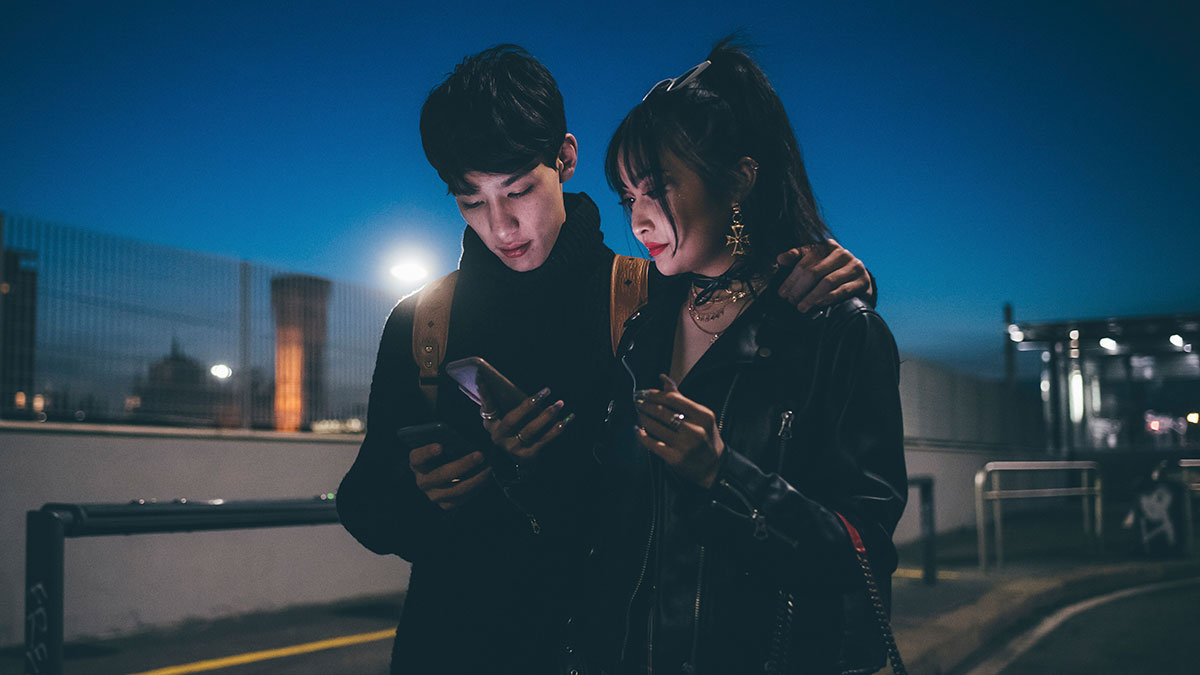
“I Can’t Even See Him As A Man Anymore”: Woman Changes Opinion About BF After He Refused To Help
(Un)willingness to help other people can tell a lot about a person. Sometimes, the way they react in a certain situation can make you see them in a different light completely, for better or worse.
That’s what happened with this redditor and her boyfriend. They were waiting for their ride after a Christmas party when the OP saw a woman standing alone on the street and a drunken guy wandering around her. The redditor didn’t hesitate to come to her help and make sure she got into her car okay, but her boyfriend didn’t seem as keen to help, which significantly influenced the way she saw him after that.
Scroll down to find the full story below, where you will also find Bored Panda’s interview with the author of several award-winning books and the founder of Humanist Learning Systems, Jennifer Hancock, who was kind enough to answer a few of our questions about helping others.
It’s important not to turn a blind eye when someone might be in need of help
Image credits: GaudiLab / Envato (not the actual photo)
This couple saw a woman standing alone on the street and a drunken guy next to her, but only one of the partners decided to come to her help
Image credits: Image-Source / Envato (not the actual photo)
Image credits: Prefer2beanon2
Every month, billions of people find themselves having to ask strangers for help
Most of us know that we can trust our close friends and family. But can we trust strangers to lend a helping hand when we need it the most? That seems to be a matter of luck as you never know what kind of people are roaming the same areas that you do.
You might be happy to learn that, according to the World Giving Index, billions of people help someone they don’t know every month. The 2014 edition of the report found that back in 2013, for instance, as many as 2.3 billion worldwide did, marking a 226 million increase since 2012.
The report noted that men were more likely than women to help strangers, though other studies suggest that empathy in everyday life is higher for women rather than their male counterparts. According to the World Giving Index, the age group ranging from 30 to 49 years of age is the most likely to help a stranger.
Another study, carried out by researchers from UCLA (University of California, Los Angeles), Australia, Ecuador, Germany, the Netherlands, and the UK, found that people around the world signal strangers for assistance every couple of minutes, and the “requests for assistance are very frequent and mostly successful; and when people decline to give help, they normally give a reason.”
Image credits: Image by Freepik (not the actual photo)
Some people might find it difficult to help others because of the bystander effect
When the woman on the street approached the OP and her boyfriend, asking if she could stay with them for a moment, the redditor didn’t hesitate to say yes. She saw that the person was in an unfavorable situation and wanted to make sure she got out of it safely. However, her boyfriend wasn’t on the same page, or at least wasn’t equally willing to act on it; and some redditors saw why – being confrontational as a man and a woman is not always received the same way.
But it’s not only fears for one’s safety (which aren’t always unfounded) that keep some people from helping others. Sometimes the phenomenon known as the bystander effect does. Making people act oblivious to the misfortune of others, the phenomenon refers to people refraining from helping others—be it providing medical aid, stopping a bully, or anything else—when they are in the presence of other people. Some sources suggest that the greater the number of bystanders is, the less likely one of them is to provide help to someone in need.
According to Medical News Today, due to the bystander effect, “People may freeze, become apathetic, avoid a plea for help, or ignore an emergency in the presence of other onlookers or bystanders.” The aforementioned source also referred to a research program from the ‘60s, which found that while any participant who was the sole bystander at the moment helped someone in need, only 62% did when they were part of a larger group.
Image credits: teksomolika / Freepik (not the actual photo)
“Whether or not anyone else does – you should do what you think is right,” expert says
But despite numerous sources citing the seemingly obvious presence of the bystander effect, recent studies seem to have disproved that the phenomenon is stopping people from helping others. An international team of researchers used CCTV video systems to examine 219 aggressive public conflicts in Amsterdam (The Netherlands), Lancaster (the United Kingdom), and Cape Town (South Africa) and found that in as much as 91% of situations a bystander, or multiple bystanders, intervened in the public conflict.
According to the founder of Humanist Learning Systems, Jennifer Hancock, whether or not a person gives in to the bystander effect largely depends on their sense of personal responsibility. “If you think a person needs help and you are thinking—someone should check to see if this person is ok—that someone is you. Just do it. Whether or not anyone else does – you should do what you think is right,” she told Bored Panda.
Talking about ways to break free from the grip of the bystander effect, Hancock admitted that she’s not an expert in the studies regarding said effect, but her understanding is that when one person comes to aid an individual, it gives others the permission to do the same.
“This is one of the things I teach about personal ethics – you don’t need other people’s approval to do the right thing. Just do it. And when you do, you will find that others appreciate that you took the initiative,” she said. “I’ve also found that by taking the initiative to be ethical and act when something is wrong, people who do this are seen as leaders because they are leading with ethics.”
According to the expert, it’s extremely important not to be apathetic to those in need of help. “If you can help someone in need, you should help them. Take the time if you can. Apathy is emotionally draining and discouraging to experience. When you choose to pay attention and to act with compassion to people in need, you feel connected, you feel alive, you feel good about yourself and about the person you helped.
“Can you help everyone? No. No one can. But if you can help an individual, help them. You will be glad you did. The hardest part of this is to find the courage to do it,” Hancock said, adding that the more you act courageously, the easier it becomes.
While the OP found the courage to help the woman in trouble, her boyfriend didn’t, which made her see him in a different light. After reading her story, some netizens sided with her, but others weren’t so quick to judge the boyfriend’s reaction and suggested that it was the way that it was for a reason. The netizens shared their opinions in the comments.
Some netizens sided with the OP
Others said it wasn’t smart of her to confront the drunken man
People shared similar stories, too
Poll Question
Thanks! Check out the results:
This has everything to do with empathy, and nothing to do with masculinity
And that's why you just dump such people out of your life.
Load More Replies...Some years ago me, my husband and his best mate was waiting at a cab station for a cab, we were approached by 2 drunk men who started to beat up the best mate, after about 10 seconds (which is a really long time to watch a friend getting beat up) I stepped in and started pulling the guys off him, it took about 2 minutes to stop the fight, and the drunks ran off leaving the best mate on the floor with a kicked in head and detached retina. My husband spent the whole time looking at his phone, apparently it all happened so quickly he did not have time to react. Suffice to say we were divorced 6 months later. This was not the reason for the divorce, but it was the straw that broke the camels back.
Friend of mine saw a lass who was sobbing her heart out in the centre of Manchester, he went to talk to her and see if she needed any help, turns out her boyfriend had slapped her and then walked off, he offered her the chance to join them in a taxi home (there were a mixture of men & women in his group), boyfriend reappears, punches, one punch, knocks my mate out, he cracks his head on the kerb, 2 weeks in a coma with reducing signs of life, life support switched off and he passes away. One punch. Manslaughter charge for the aggressor. I am VERY wary of stepping into any situation I can’t fully control. My masculinity isn’t harmed by me staying safe. Sorry, your safety is important but I won’t risk my life in order to protect yours.
I'm very sorry for your friend, it's truly tragic, but there was no situation he stepped into. He did not confront the aggressor, he just wanted to help a crying girl. Is this already considered a dangerous situation?
Load More Replies...This has everything to do with empathy, and nothing to do with masculinity
And that's why you just dump such people out of your life.
Load More Replies...Some years ago me, my husband and his best mate was waiting at a cab station for a cab, we were approached by 2 drunk men who started to beat up the best mate, after about 10 seconds (which is a really long time to watch a friend getting beat up) I stepped in and started pulling the guys off him, it took about 2 minutes to stop the fight, and the drunks ran off leaving the best mate on the floor with a kicked in head and detached retina. My husband spent the whole time looking at his phone, apparently it all happened so quickly he did not have time to react. Suffice to say we were divorced 6 months later. This was not the reason for the divorce, but it was the straw that broke the camels back.
Friend of mine saw a lass who was sobbing her heart out in the centre of Manchester, he went to talk to her and see if she needed any help, turns out her boyfriend had slapped her and then walked off, he offered her the chance to join them in a taxi home (there were a mixture of men & women in his group), boyfriend reappears, punches, one punch, knocks my mate out, he cracks his head on the kerb, 2 weeks in a coma with reducing signs of life, life support switched off and he passes away. One punch. Manslaughter charge for the aggressor. I am VERY wary of stepping into any situation I can’t fully control. My masculinity isn’t harmed by me staying safe. Sorry, your safety is important but I won’t risk my life in order to protect yours.
I'm very sorry for your friend, it's truly tragic, but there was no situation he stepped into. He did not confront the aggressor, he just wanted to help a crying girl. Is this already considered a dangerous situation?
Load More Replies...
 Dark Mode
Dark Mode 

 No fees, cancel anytime
No fees, cancel anytime 



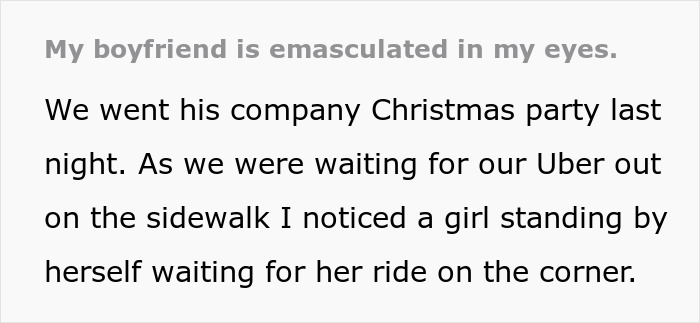

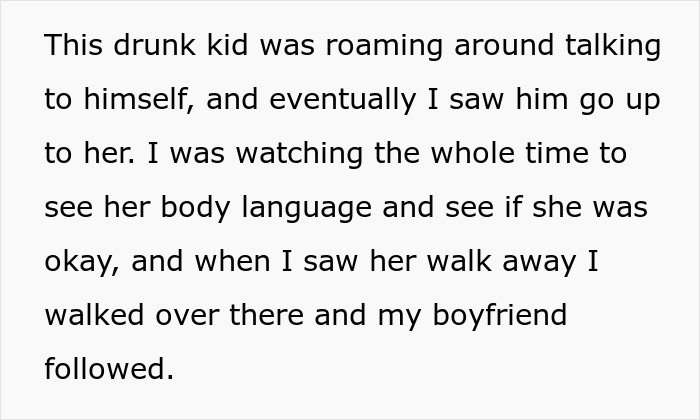
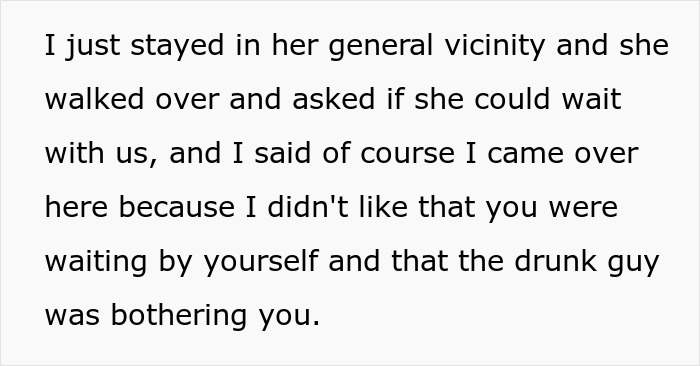

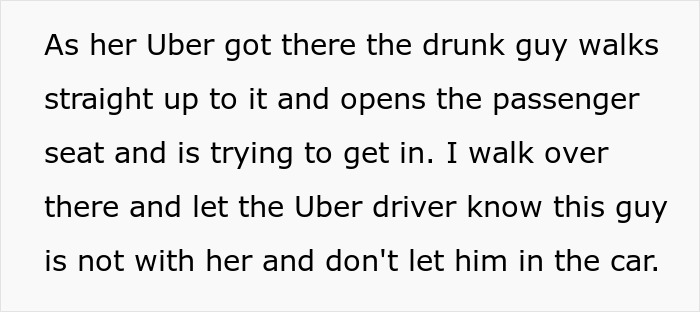
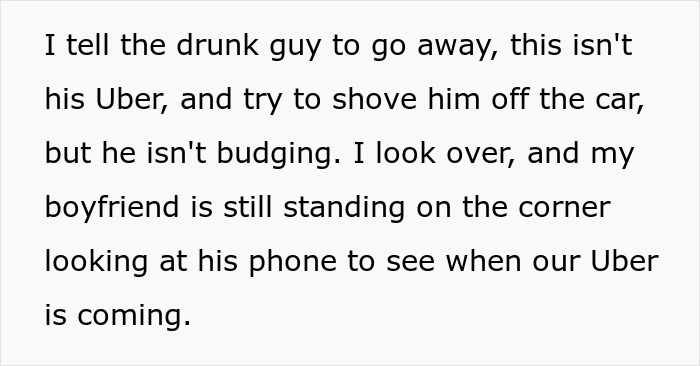
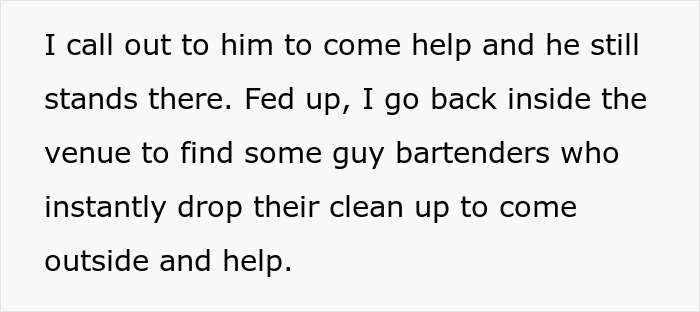

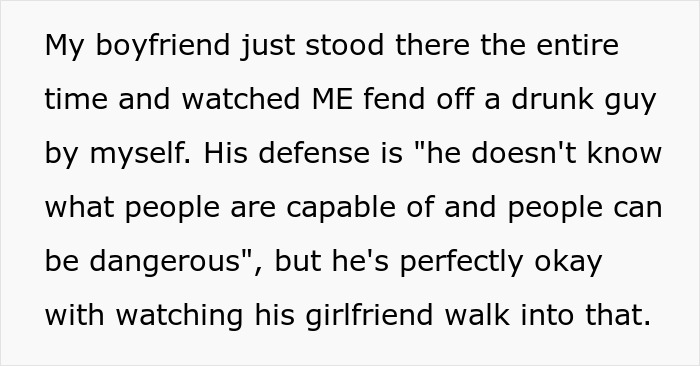







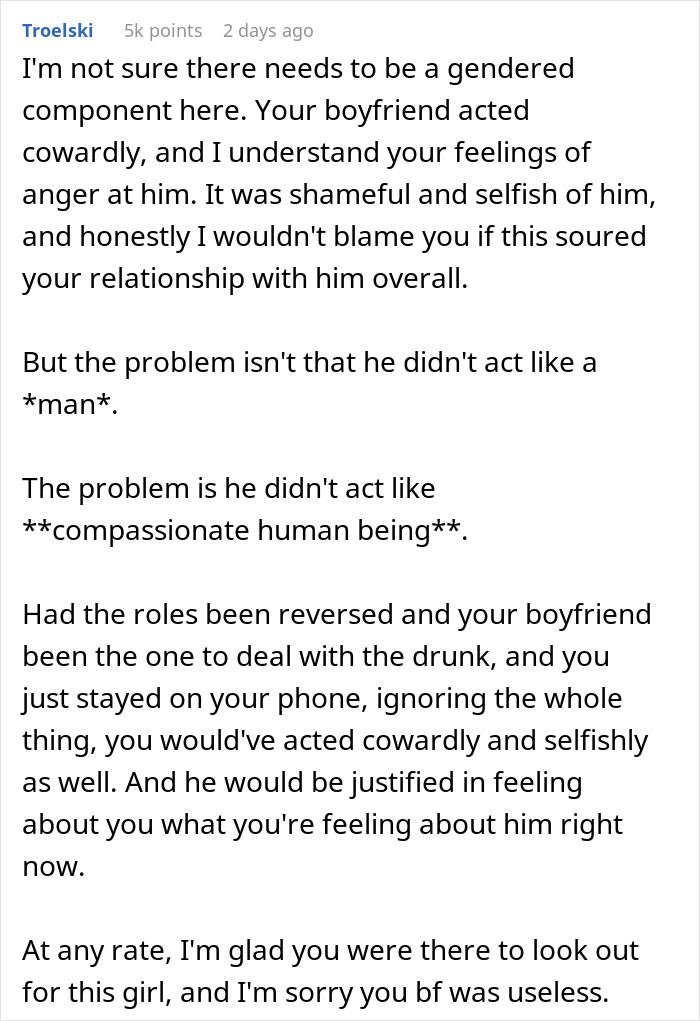

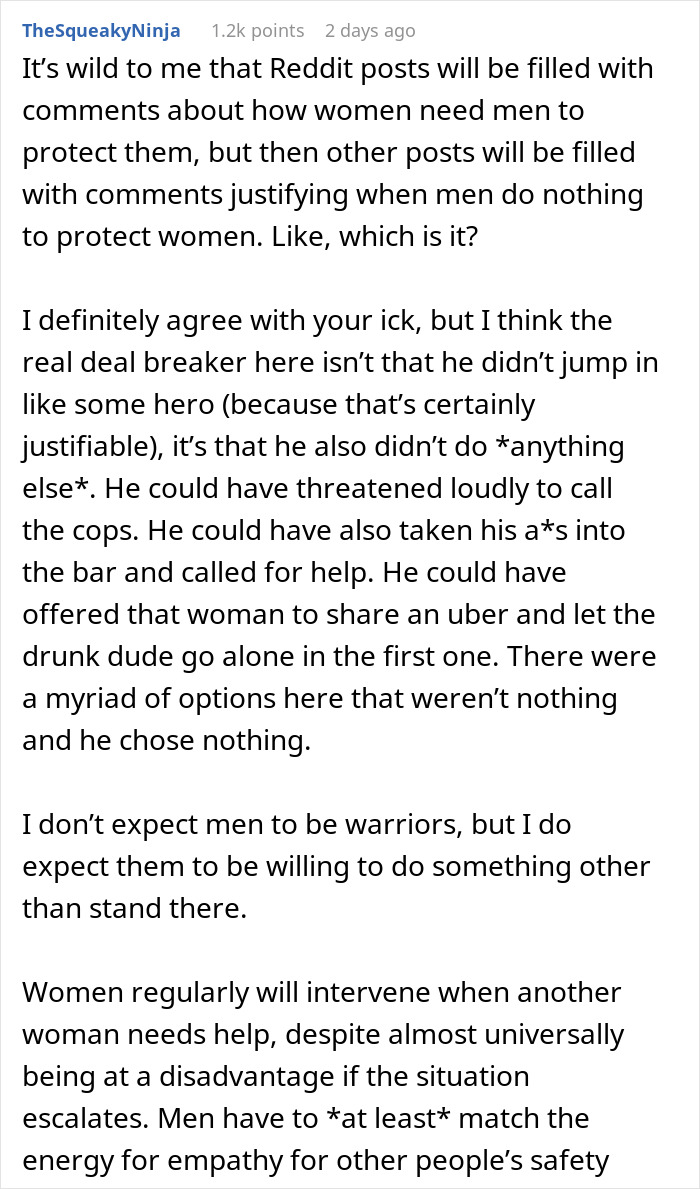

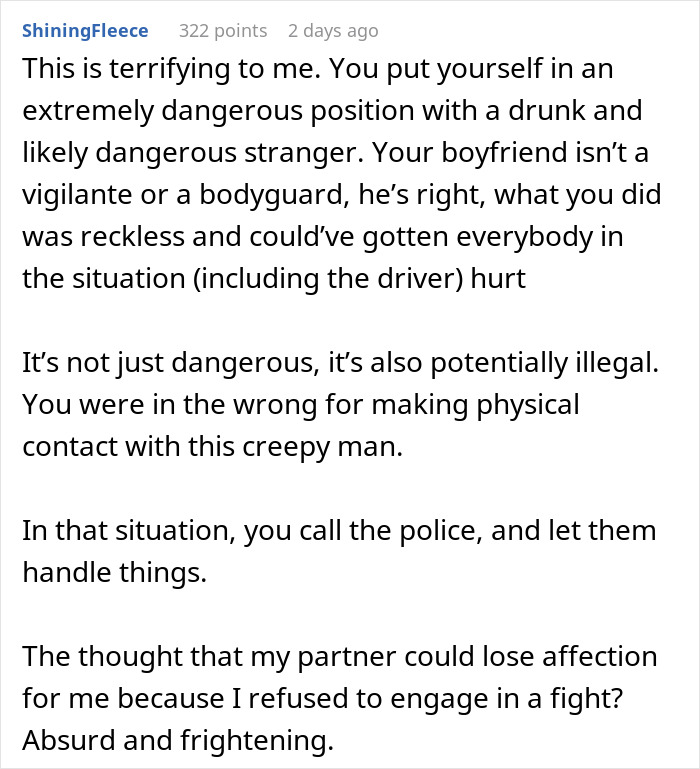
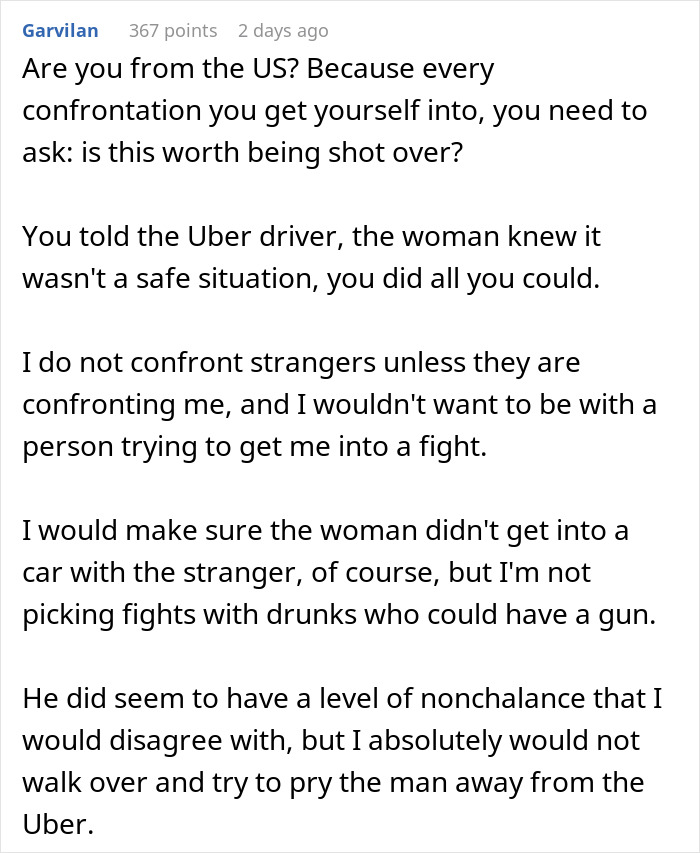
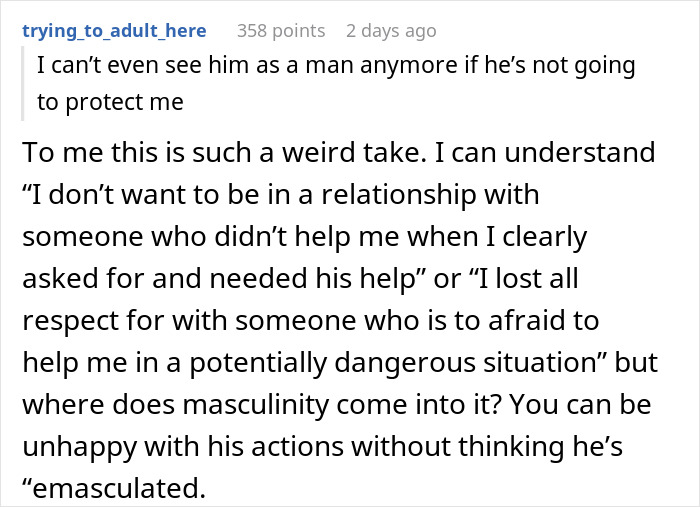

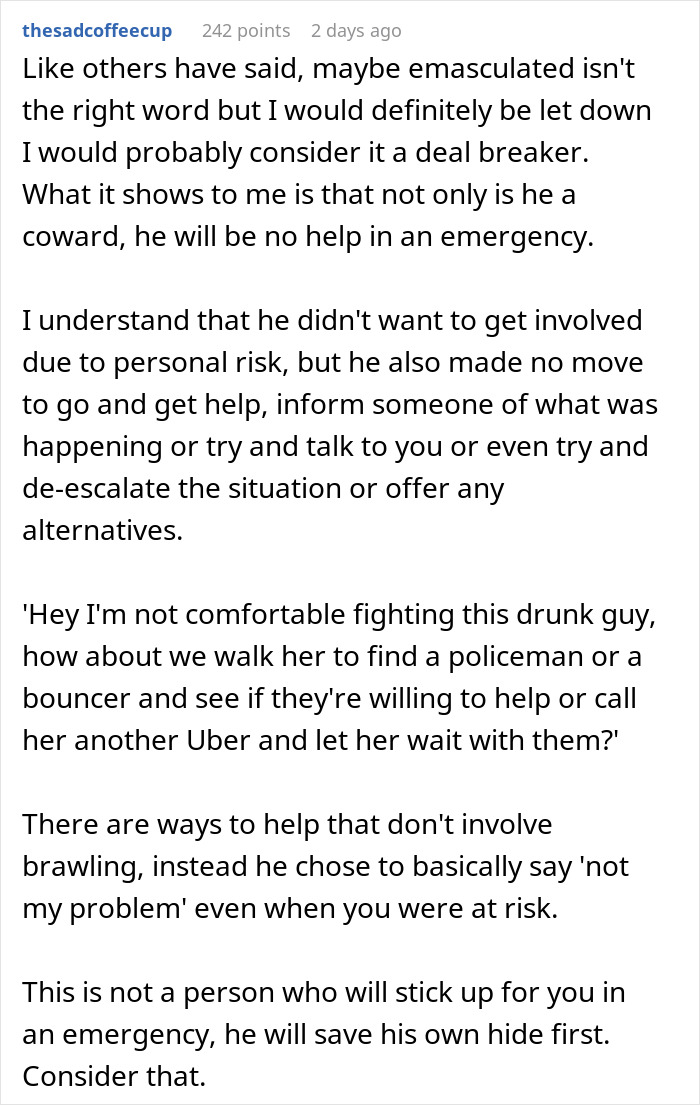
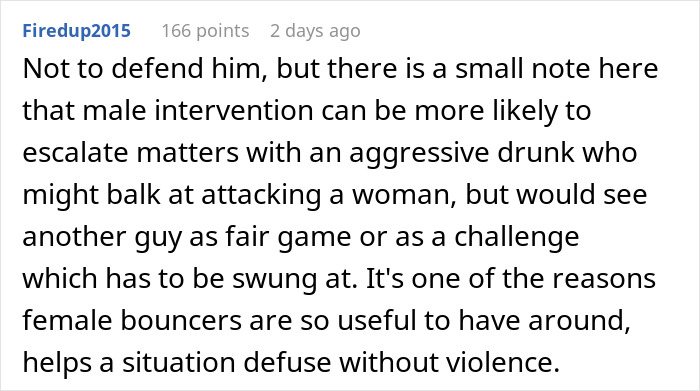
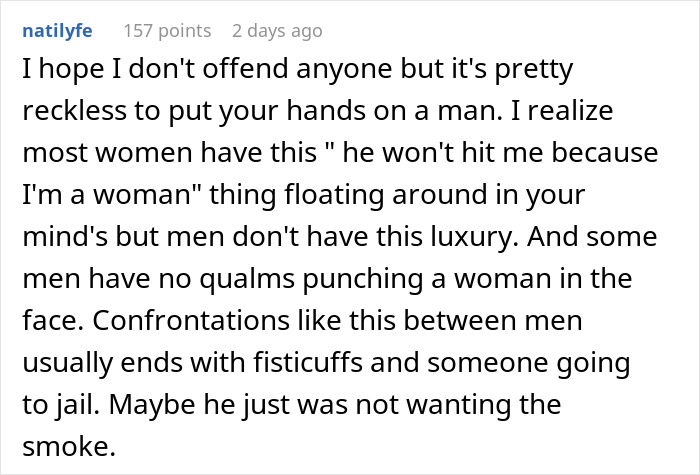
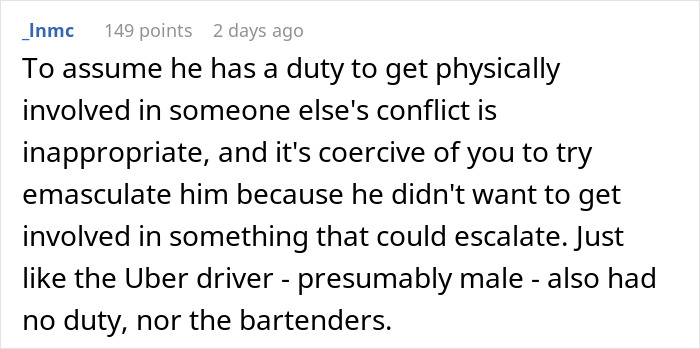

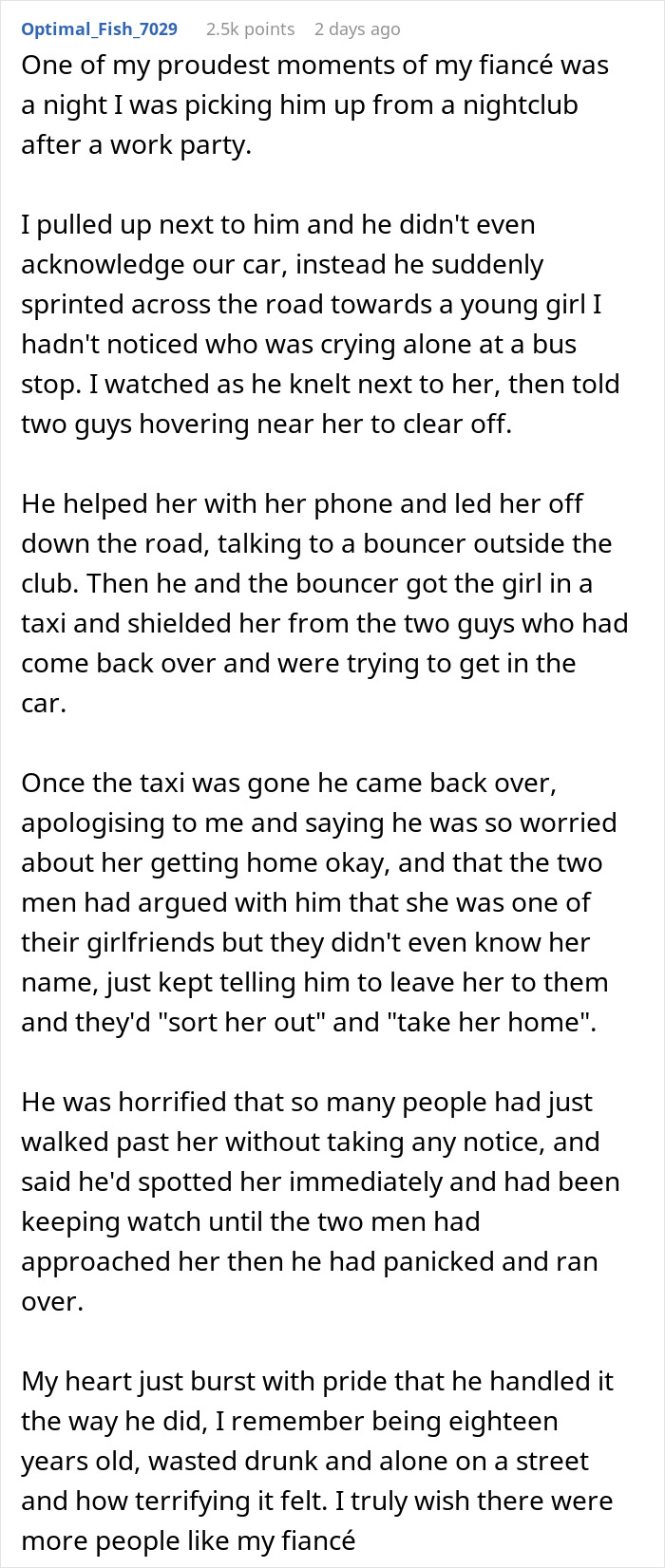
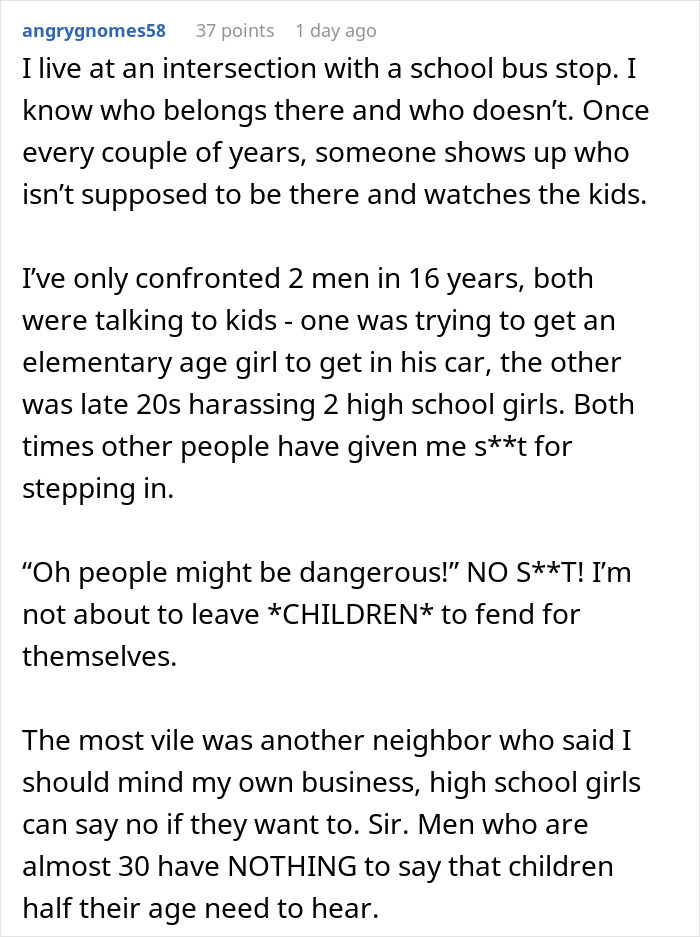
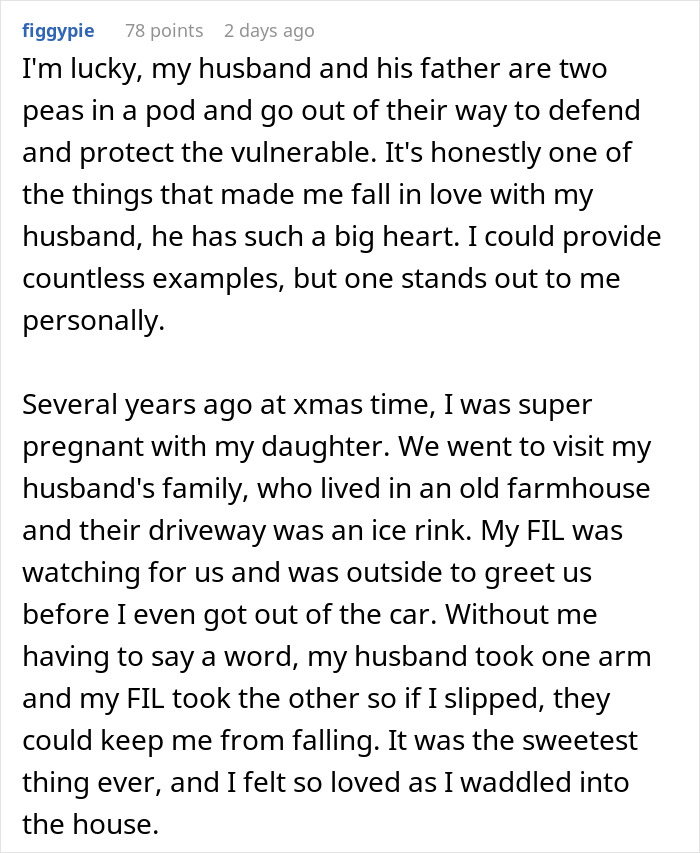













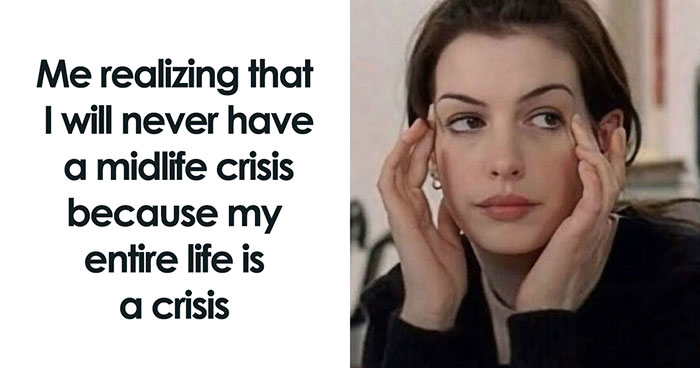
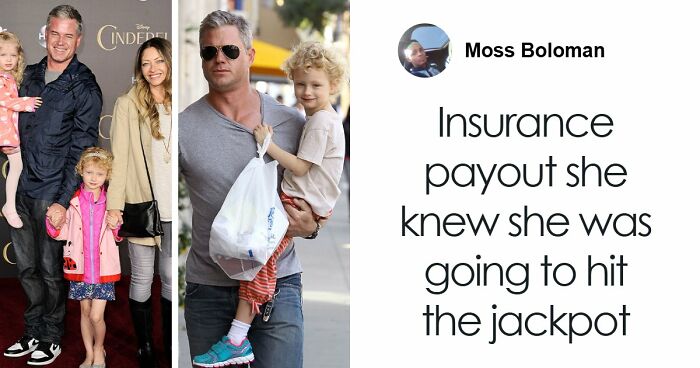






























42
75